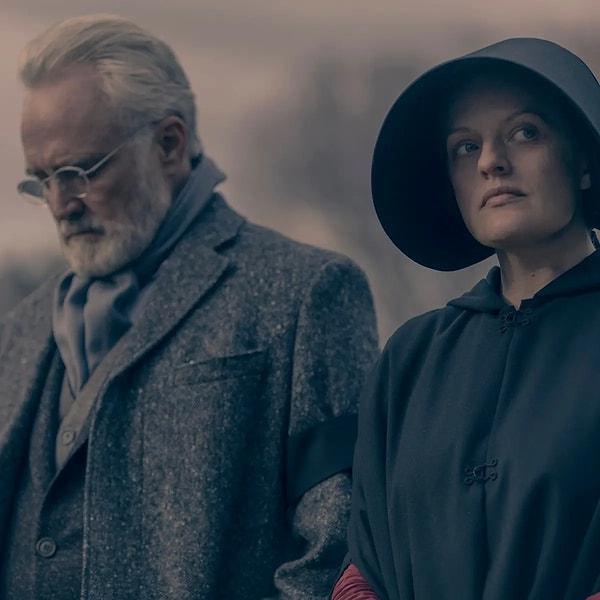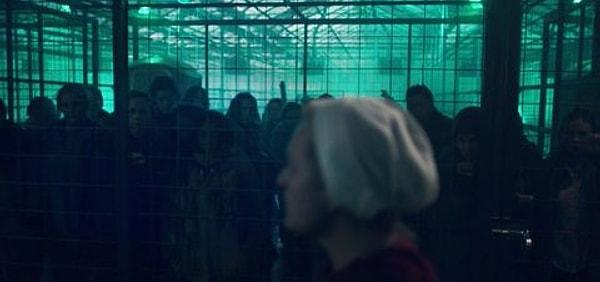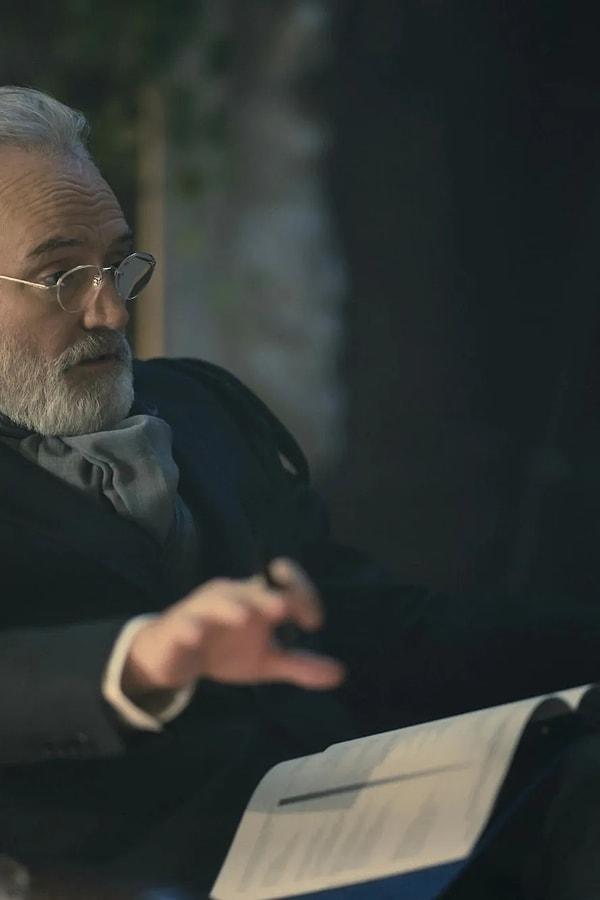New Bethlehem, the Hong Kong of Gilead in 'The Handmaid's Tale'
Warning: This article contains spoilers for 'The Handmaid's Tale' season 5 episode 8, 'Motherland,' which aired October 26, 2022.
Blessed be the Fruit Loops!
Submission in Gilead was never enough. You could memorize all the prayers and follow all the rules, and there would still be somebody looking over your shoulder, aching for a reason to snatch you up and send you to the colonies. Their economic system was dependent upon a steady workload. There had to be a balance of slaves and mouths to feed. So they spread suspicion and fear, turning neighbors and families against one another. Like the econos said in season two, everyone was spying on everyone else.
They were hoping to get into the good graces of the regime so they could protect themselves, but what they didn't understand was that Gilead was its own beast. Nobody was safe, not even the commanders or their families. What they set loose on the earth would run rampant, taking tens of millions of lives with it.
Joseph Lawrence didn't go through the motions. He was vulgar and sharp-tongued with a sickening smile and a biting sense of humor. If he tried to play the game nobody would believe him, so he lived his truth. He could be as sarcastic, as angry, or as flippant as needed to be. But he stayed on point, perpetually preaching about the prosperity and welfare of the nation. He was the kooky architect of Gilead, and behind the scenes he was a savvy power player, able to meld in with hypocritical commanders, who likely saw their inner selves in his outwardly impious outlook. It worked because he never wore his true intentions or his feelings on his sleeve. He never told people what he wanted for Gilead either. He kept his sentiments a secret to all. The only thing people could be sure of was that he cared.

Eleanor's funeral, Courtesy of Hulu
The Man Behind the Myth
Joseph has always had a way of keeping people out of his head--a dual-sided nature, apparent in every line. When we were first introduced to him in season two, he asked his martha if she wanted a beating, and it was impossible to tell if he was joking or not. Maybe he would beat her. Maybe he was a Gilead loyalist and a true misogynist, or maybe it was just an empty threat. He uses this way of speaking to keep people out and shield them from what he really thinks. It throws everyone off, not just the people in the series, but the audience as well. Nobody can agree on who he is or what he wants. They simply do not trust him.
June had a terrible time trying to understand him, though she was probably the only one to see his true self. She approached Commander Waterford at a luncheon, begging him for a clue as to what to expect while living in Commander Lawrence's home. Fred teased her, saying that he didn't like getting bored. That evening, she essentially stormed into Joseph's office, saying that it must be horrific knowing that the numbers in his files were real people being executed. He was playing with lives, and he knew it.
She touched a nerve, but Joseph played it off seamlessly, saying how easy it would be to invent a humanity in someone, to assume that they were compassionate and kind. He took her to the pens, where women were held in limbo while the commanders decided what to do with them, and he told her to pick a handful of women to be marthas; the rest were being sent to the colonies. It was his way of illustrating what it was like to be him. Joseph believed that in order to save the human race, stop the fertility crisis, and fix the country, he would have to make terrible decisions. It was a moral conundrum, and in his mind, it was all for a higher purpose.

Courtesy of Hulu
In that same episode, he uses June as a prop to illustrate a point. He asks her to grab a book from his shelf in his office, the Descent of Man by Charles Darwin, proving that women can be of use--in fetching things at least. The show makes a point to let us look over the other books, many of which were written by him. Through the titles, we learn that he was a socio-politcal economist, who saw a correlation between religiosity and economic prosperity. He believed that human rights were undermining American institutions and that a different approach was needed if they were going to solve global warming and the fertility crisis.
He expands on all of this in the most recent episode, giving us a clearer picture of how he sees things. While June was cleaning up graffiti outside her house with Moira and Luke, she received a surprise call from Joseph, announcing how nice the weather was in Toronto. He told her that he had information on Hannah to lure her in, and she agreed to meet with him. He said that democracy, liberty, and justice--which were defined initially by a group of hypocritical white slave owners--had collapsed under the weight of late-term consumerism.
He looked at the mountains of plastic building up from factories in China, the clouds of filth swimming through the air, and our beaches covered in waste, and decided that people shouldn't be allowed to have whatever they wanted. Rampant production, greedy capitalists, and basic human greed 'broke our pretty little planet' and almost destroyed the human race. In order to stop all of that, he believed that people needed to be controlled. They couldn't be allowed to buy as many water bottles and plastic straws as they wanted. They couldn't spew gas into the air with their cars. Human nature needed to be put into check. To him, there was no other way.

Courtesy of Hulu
Joseph went on to explain that in order to check human greed, he was forced to use religious extremists--men like Fred Waterford and Warren Putnam. He knew from his studies that religion was a potent tool, not just for economic prosperity, but also for controlling the masses. There are countless examples throughout history where people would set aside their moral code in favor of false beliefs. This works for many reasons. But the strength of their toxic zealotry and the pliable nature of the human mind is undeniable. It takes over entire nations, driving the masses to madness.
Joseph decided to use the most powerful tool available to him, calling it triage--a desperate measure in a desperate time, even though he himself was not religious. We know this because at the end of season three, when he tried to call off Angel's Flight, he told June that the universe did not have a balance sheet. She made a point to tell him that she was religious--a woman of faith--and that was the difference between them.
Joseph claimed that he underestimated the depravity of the faithful. He said that things got out of hand, but that's deceptive. He knew exactly what he was doing when he created Gilead. He just didn't realize what it would be like to see the beast that he was creating in action. It hurt. He drew into himself, staying at home, urging his wife to stay in her room. He stuck with numbers, so he wouldn't have to see people. He told himself that he was saving the human race, making hard decisions. It had to be done--even as his wife shrieked at him, calling him a monster, and the world crumbled around him. That was when June walked in. She grabbed him by the scruff, tirading about how terrible he must feel, and she rubbed his nose in it. She wasn't going to let him forget, because that is what she does. She brings out the decency in others.
A Changed Man
Gilead must've found a way to creep into the Lawrence home when he was shielding himself, surrounded by deviant art, listening to hippy music, and going about his life. The numbers June spoke about, representing the women he moved from the pens into the colonies, were in fact a reminder of his crimes. He didn't let it show, but every time he wrote something, every decision he made, every file he looked at, he was just digging himself deeper into one of the worst mistakes of human history. It got so bad, especially after his wife's death, that he became suicidal--understandably so.
Joseph voices that in the most recent episode, but his words do nothing to describe the guilt he must have wrestled with. Imagine how you would feel if you ran over a child in the street, or your mother died of a heart attack when you were yelling at her. Think of the pain. You would lose all of your confidence. You wouldn't be able to show your face to the world. You might end up in bed, sobbing under the covers, shaking and sweating, curled up into a fetal position. Now imagine that happened a million times over--ten million. You would literally topple over from the weight of what you had done.
Joseph kept himself alive to change Gilead, turn back time, and try to stop some of the atrocities committed by the regime. But he still didn't fully change. The speech he gave to June in the most recent episode, detailing the collapse of liberty and justice, proved that he still believed in the system he had created. It makes perfect sense. He was an academic who devoted much of his life to his work. He knew that Gilead would succeed in their goals before the idea even had a chance, and he watched it happen. As he said, they were making babies. That's a recipe for unshakable faith. Whatever reforms Joseph instates will be tainted by his short-sightedness and his refusal to accept other means of saving humanity. The alternatives are not a secret. Invitro fertilization, birthing charities, and better fuel sources would've all been effective. Gilead rejected them for religious reasons. They were conservative antitechnologists. Joseph rejected them because he believed in control. He thought human rights and freedoms were counterproductive. Liberty was a failed experiment. That's why he told June that if he could, he'd stop the rise of Gilead and let the human race die. That's what he thought his choices were, either Gilead or extinction.

Courtesy of Hulu
Two Systems One Country
All throughout season five, we've been hearing whispers about New Bethlehem. Putnam was deadset against it. He was our first glimpse at what Joseph was trying to do. He approached a map in Joseph's office--which was in fact there the whole time--and criticized him for wanting to bring back criminals and terrorists, welcome them home, and coddle them. He thought it would be the death of the nation. Joseph wasn't having it. When Putnam died, it was because he wasn't backing the plan, not because he violated poor Esther.
Joseph's idea was to create a small island settlement, where they could lure back refugees, give them a place to exercise their freedoms, and reunite them with their loved ones. It would give Gilead an in with the United Nations, and allow them to retake America's place on the world stage. It would also work as an example for reforms that Joseph wanted to institute throughout the country, like civil liberties and human rights. His plan was intricate and somewhat strange, but it wasn't without precedent.
Joseph mentioned several historic examples in the most recent episode, and the one that stood out the most was Hong Kong. He called it one country, two systems, the phrase commonly used to describe Hong Kong's relationship with the People's Republic of China. The region, which lies in the eastern Pearl River Delta, is officially a part of China, but it operates under different principles, and it's set up to be separate from their main governing bodies. It also has a vast array of cultural differences, from the dialect they speak--which couldn't be more different--to their cuisine and societal makeup. They are Chinese, but they're not members of mainstream society in the People's Republic. For the most part, they can't even understand one another. Some of this is intentional. Hong Kong isn't exactly patriotic. At times it seems as though the entire region is a great big middle finger pointed at Beijing. For years they held parades in honor of the Tiananmen Square protests. They're a bastion for capitalism, organized crime, religion, and democratic values. Everything the party censors or tirades against, they produce with zeal, and it's easy to see why. Until 1997, Hong Kong was more or less under the control of the United Kingdom. They only agreed to become a part of the People's Republic under the condition that they would be allowed to rule themselves. Beijing wouldn't let that happen, of course. Instead, they signed an agreement saying that Hong Kong could have semi-autonomous rule for 50 years.

Photo Courtesy of thinboyfatter via Flickr
China is very different from Gilead. There's no theocracy, and there's a level of freedom that June and the others would've found comforting, but they are both garnished with window dressing, and they're both power-hungry states that struggle to maintain control over their populace. Beijing designated Hong Kong a special administrative region. They would be allowed to elect their own leaders, pass their own laws, and live as they saw fit. To Beijing's credit, this agreement did last for some time, but their patience wore thin, and they did interfere at key points in history.
In 2019, they tried to impose an extradition bill, which would allow criminals to be taken to the mainland. This would give them the ability to enforce Chinese law in Hong Kong, which they considered to be a serious breach of their rights. The protests that erupted were said to have been the largest in the history of a region known for demonstrative action. Beijing and the Hong Kong government both cracked down, and there were widespread images of police brutality, harsh enforcement measures, and talks of a takeover from the mainland. As a result, Beijing passed a law that would require all political candidates to be vetted by the People's Republic, effectively nullifying their one country two system agreement. This was after years of Beijing's efforts to erode their autonomy.
The world watched with a hefty dose of cynicism. They knew that eventually China would sweep in, break the agreement and take control, and they knew it wouldn't be a pretty affair. Sure, they'd maintain some facade, and try to act like they were respecting Hong Kong's so-called independence. They might even grant the people a measure of freedom, but China, like Gilead, could never really help themselves. That's why it was so ironic when Commander Lawrence compared New Bethlehem to Hong Kong.

Courtesy of Hulu
Gilead's main justification for the war was that women brought a curse upon the nation. God saw their vanity, their Tinder, and their birth control, and he decided to cook up a special plague of infertility. This is based on a reigning theme throughout the Old Testament. The Israelites or some evil foreign race would do something that God didn't like, and he'd smite them for it. The idea is that a peaceful, happy nation is a Christian nation, one that abides by the laws set before them in scripture. If something goes wrong, there's always someone--some sinful demographic to blame. This often comes up whenever there's an attack or a war. It's something that people come back to, and it's something that Gilead strongly believes in. They will not allow sinners to live freely within their borders. Eventually, someone will pull out that old excuse and invade New Bethlehem, and it wouldn't take long for them to do it.
But that's just window dressing. The real reason Gilead can't maintain two systems is because they spur economic growth through slave labor. When things began, they needed to round up as many people as they could, put them in work camps, and try to feed whoever they decided could live. Soon, new children were born. The fertility crisis lessened, and there were more mouths to feed, so they came up with new laws. They tightened restrictions, and took more people in. Their need for more--their basic human greed--could be justified with righteousness and a desire to impose God's rightful order. As piety truly became the law of the land, Gilead prospered--not because God smiled upon them, but because they had an army of slaves and an ongoing witch hunt they could use to round more up. New Bethlehem would get eaten alive by a country that cannibalized itself.
The fact that Commander Lawrence didn't understand this is a testament to his naivety. He created Gilead's economy to counter the greed of the free market, and instead, he simply added ruthlessness and extremism to the equation. It's so obvious. Perhaps he knows, and he's grasping at straws, or perhaps the nature of what he's built is so horrific he can't allow himself to see it for what it is.
Keşfet ile ziyaret ettiğin tüm kategorileri tek akışta gör!

Send Comment